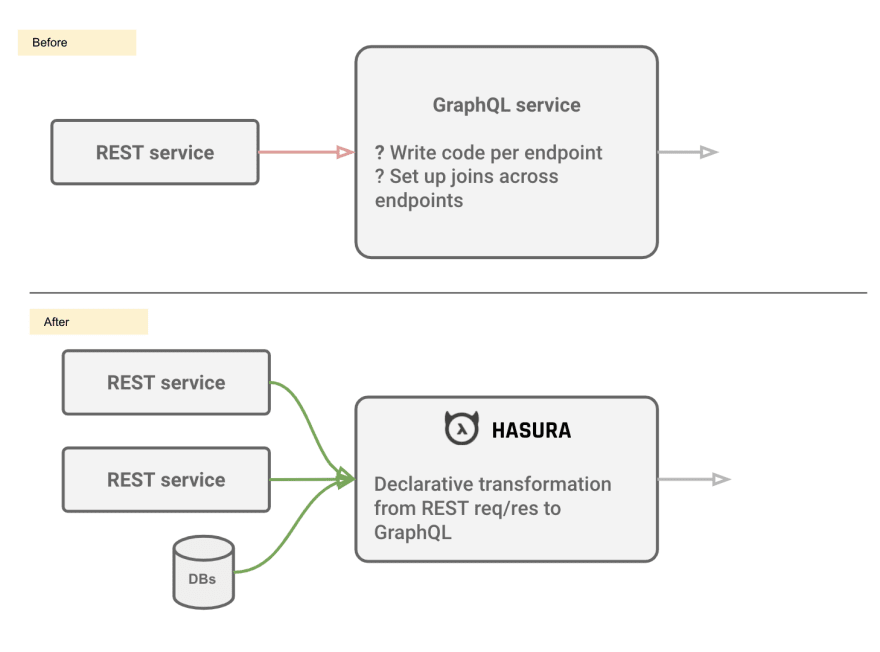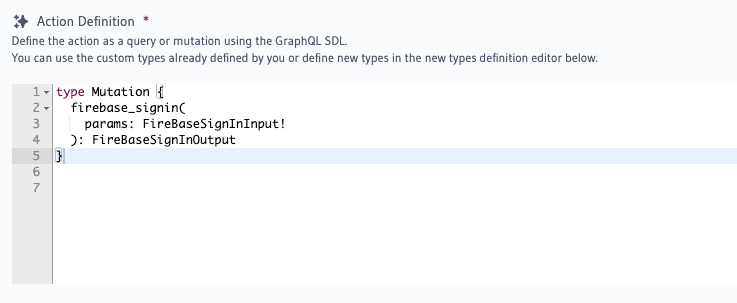This article was originally published on the Hasura blog. If there are formatting errors in the article below, we urge you to please go to our blog and read it there. Thanks! :)
We’re excited to announce some big updates to the Hasura GraphQL engine which further simplify data access for developers by eliminating data silos and easing the adoption of GraphQL across teams and organizations. As data proliferation increases, we continue to help bridge the gap for developers to easily access data irrespective of where it is stored. Today’s features work to solve exactly that challenge, and we think you’ll love the new capabilities landing today.
And don’t miss the surprise announcement at the end!
REST Connectors
The first of our new features allows for connecting REST endpoints with low-code simplicity through request transforms. By transforming your GraphQL request using a minimal templating language, you can often bypass the need for writing proxy functions for connecting existing REST endpoints with Hasura. You can modify the request URL, query parameters, method, and headers for maximum flexibility. This allows developers to instantly integrate existing REST API as well as leverage SaaS REST APIs:
Diagram of data layer with Hasura REST transforms
With Action Transforms, Hasura helps you streamline the code you write even more to focus on domain code, not glue code, transforming the request with the input type parameters.
With Event Transforms, you can modify the Hasura payload that gets sent to your event handler using the same mechanisms available in Action Transforms.
Action Transform
With REST APIs, the individual endpoints are universal across projects, typically only varying by authentication or query parameters. To help learn from each other and share the different connectors that are being written, we’d like to announce the next launch happening today.
Introducing Data Hub
We are excited to announce a new home for data connections with Hasura, including the new Action Transforms and Event Transforms – the Hasura Data Hub. This new hub will act as a single place to discover, learn, and contribute all the ways to connect your existing data to Hasura from Remote Schemas to Action Transforms and more. Looking for an Airtable or Auth0 connector? You can find it on the Data Hub.
Want to show the world that they can quickly connect Hasura to your own Data source? Contribute to the Data Hub! Data layers benefit from a community working to build robust connections together, and we’re very excited about offering a streamlined place to do just that.
Hasura Data Hub
Once you have your data connected together, you’ll need a way to protect and maintain proper access controls on that data – a feature that people have loved about Hasura’s own auto-generated APIs. That brings us to the next launch happening today.
Identity-specific Authorization for ALL GraphQL Services
Hasura now supports role-based access controls for remote schemas and data joins. You can extend your same role-based permissions to any data source connected to Hasura, modifying the shape of the exposed schema, for both individual types and fields. Connect your data, define your permissions, and get immediate benefit, today.
Google Cloud support in beta
Along with all the great features we are announcing today, we’d also like to announce that Hasura Cloud is now available in Google Cloud. Hasura Cloud is the fastest way to try out the many great features of Hasura with a no-ops environment, built-in observability, and performance features. Now you can use Hasura Cloud with Google BigQuery and Google Postgres from within Google Cloud, eliminating egress fees and benefiting from even greater read/write performance. Follow the links to request for beta access and let us know which regions you’d like to see added!

Hasura Choose Region Select Box
M1 more thing
Starting today, the official Hasura docker images are compatible with Arm architecture and run on Apple silicon. Enjoy all the great speed benefits of Apple’s great new architecture along with your favorite GraphQL data layer tool.
Summary
That’s a wrap for the feature announcements today, the team has been hard at work on all the architectural changes needed to make today’s launch possible. All these new features can be found in Hasura or Hasura Cloud running version 2.1.0 – all new projects will use this version by default.
Join us on Discord for even more features to be announced around data connectors in the coming weeks!
We also have our end of the year community call this Thursday, at 9am PT and we’ll be showing off some of these features and more! So do join us as we wrap up and celebrate this year with our team and community.














Top comments (0)